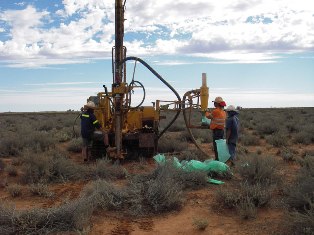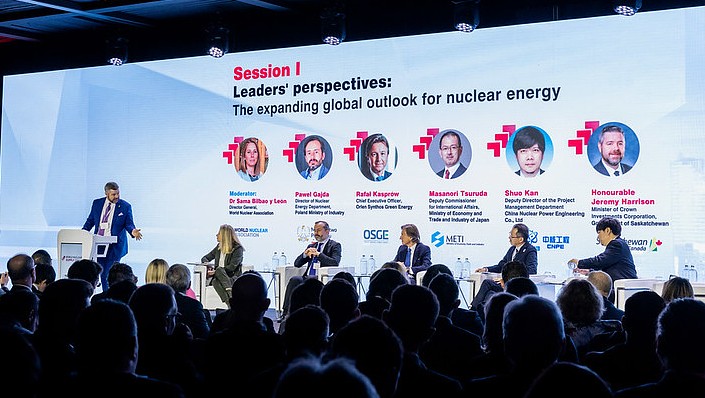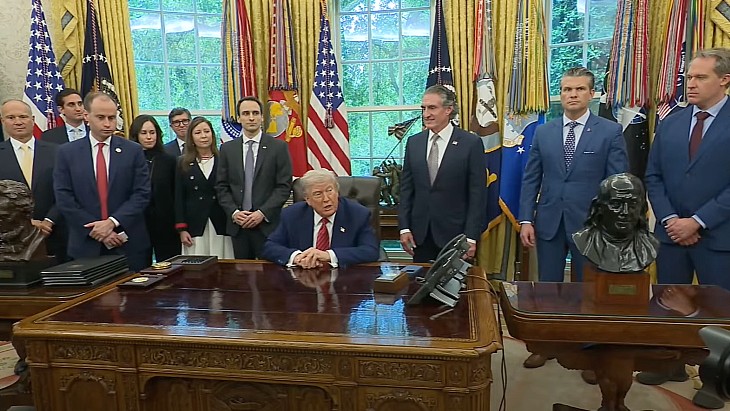Japanese take a stake in Western Australia project
Monday, 2 March 2009
Mega Uranium, Japan Australia Uranium Resources Development (JAURD) and Itochu Corp have entered into a non-binding memorandum of understanding in respect of the proposed farm-in and joint venture, which provides for aggregate payments of $49 million by JAURD and Itochu to Mega Uranium in order to earn their aggregate 35% interest in the Lake Maitland project.
JAURD is a Japanese company set up to purchase uranium resources in Australia on behalf of its shareholders. These include three Japanese utilities - Kansai Electric Power Co (50%), Kyushu Electric Power Co (25%) and Shikoku Electric Power Co (15%) - together with trading company Itochu (10%). JAURD's three utility partners have a combined installed nuclear capacity of 17,048 MWe from six nuclear power plants.
Mega Uranium's president, Stewart Taylor, said, "After many months of negotiations, we have reached a favourable deal and are pleased to welcome our Japanese partners to help us advance the Lake Maitland project to production." He added that JAURD's shareholders, Kansai, Kyushu and Shikoku, "will have access to uranium produced at Lake Maitland for their own use and Itochu will be able to participate in additional uranium off-take arrangements from the project."
The partners will enter into a definitive farm-in and joint venture agreement which initially provides that JAURD and Itochu will make payments to Mega Uranium for feasibility studies at Lake Maitland in order to earn 35% interest in the project, with further payments in due course, subject to favourable results in feasibility studies, including those for the alkaline leaching process.
A definitive farm-in and joint venture agreement by the parties is subject to a number of conditions, including satisfactory completion by JAURD and Itochu of their due diligence, approval by the boards of all three partners, as well as Australian regulatory approval.
Sheldon Inwentash, chairman and CEO of Mega Uranium, commented, "We completed early prefeasibility studies and advanced metallurgical work ahead of the Western Australian government's positive stance on uranium mining, which positioned Mega to be at the forefront of uranium activity in the state and allowed us to demonstrate the viability and robustness of this project to JAURD and Itochu."
In September 2008, the Western Australia government ended its de facto ban on mining uranium. The issue of uranium mining had been a key issue in the recent election. At that time, Mega Uranium - which had threatened to pull out of Australia if Alan Carpenter of the Labor Party had won the election - said there was "no longer any political impediment" to the development of its Lake Maitland project. The company also said that it was on schedule to develop a mine and commission a plant in 2011 with an initial production capacity of 750 tonnes U3O8 per year.
Lake Maitland contains a national instrument (NI) 43-101 compliant Inferred Resource of 23.7 million pounds U3O8 (10,750 tonnes U3O8) at an average grade of 0.03% U3O8. Mega Uranium acquired the Lake Maitland uranium resource in December 2006 through the takeover of the Australian public company, Redport Ltd. In February 2007, Mega announced it was fast-tracking development work at Lake Maitland.
 Canada's Mega Uranium is proposing to sell 35% of the Lake Maitland project in Western Australia to a consortium of Japanese companies, including utilities Kansai, Kyushu and Shikoku Electric Power Co, as well as trading company Itochu.
Canada's Mega Uranium is proposing to sell 35% of the Lake Maitland project in Western Australia to a consortium of Japanese companies, including utilities Kansai, Kyushu and Shikoku Electric Power Co, as well as trading company Itochu.
Canada's Mega Uranium is proposing to sell 35% of the Lake Maitland project in Western Australia for $49 million to a consortium of Japanese companies.
 |
| Drilling at Lake Maitland (Image: Mega Uranium) |
JAURD is a Japanese company set up to purchase uranium resources in Australia on behalf of its shareholders. These include three Japanese utilities - Kansai Electric Power Co (50%), Kyushu Electric Power Co (25%) and Shikoku Electric Power Co (15%) - together with trading company Itochu (10%). JAURD's three utility partners have a combined installed nuclear capacity of 17,048 MWe from six nuclear power plants.
Mega Uranium's president, Stewart Taylor, said, "After many months of negotiations, we have reached a favourable deal and are pleased to welcome our Japanese partners to help us advance the Lake Maitland project to production." He added that JAURD's shareholders, Kansai, Kyushu and Shikoku, "will have access to uranium produced at Lake Maitland for their own use and Itochu will be able to participate in additional uranium off-take arrangements from the project."
The partners will enter into a definitive farm-in and joint venture agreement which initially provides that JAURD and Itochu will make payments to Mega Uranium for feasibility studies at Lake Maitland in order to earn 35% interest in the project, with further payments in due course, subject to favourable results in feasibility studies, including those for the alkaline leaching process.
A definitive farm-in and joint venture agreement by the parties is subject to a number of conditions, including satisfactory completion by JAURD and Itochu of their due diligence, approval by the boards of all three partners, as well as Australian regulatory approval.
Sheldon Inwentash, chairman and CEO of Mega Uranium, commented, "We completed early prefeasibility studies and advanced metallurgical work ahead of the Western Australian government's positive stance on uranium mining, which positioned Mega to be at the forefront of uranium activity in the state and allowed us to demonstrate the viability and robustness of this project to JAURD and Itochu."
In September 2008, the Western Australia government ended its de facto ban on mining uranium. The issue of uranium mining had been a key issue in the recent election. At that time, Mega Uranium - which had threatened to pull out of Australia if Alan Carpenter of the Labor Party had won the election - said there was "no longer any political impediment" to the development of its Lake Maitland project. The company also said that it was on schedule to develop a mine and commission a plant in 2011 with an initial production capacity of 750 tonnes U3O8 per year.
Lake Maitland contains a national instrument (NI) 43-101 compliant Inferred Resource of 23.7 million pounds U3O8 (10,750 tonnes U3O8) at an average grade of 0.03% U3O8. Mega Uranium acquired the Lake Maitland uranium resource in December 2006 through the takeover of the Australian public company, Redport Ltd. In February 2007, Mega announced it was fast-tracking development work at Lake Maitland.
Most Read
_49098.jpg)
Framatome's ATF reaches new operational milestone
Friday, 15 November 2024
_57190.jpg)
Russia places 'tit-for-tat' ban on US uranium exports
Monday, 18 November 2024
_70526.jpg)
DOE selects HALEU enrichment providers
Friday, 18 October 2024
_75453.jpg)
US DOE awards contracts to spur HALEU supply chain
Wednesday, 9 October 2024
Podcasts & Features
Podcast: World Nuclear Supply Chain conference
Podcasts & Features Wednesday, 18 June 2025
Podcast: President Trump's nuclear announcements
Podcasts & Features Thursday, 29 May 2025

Related Links
Related Stories






